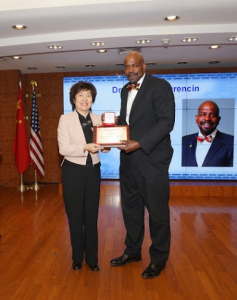By Cato T. Laurencin, M.D., Ph.D.
On March 4-6, the National Medical Association (NMA) hosted its 17th National Colloquium on African American Health in National Harbor, Maryland. This year’s theme, “True North Toward Health Care Equity: Clinical, Policy, and Social Determinants” conveyed the NMA’s objective to eliminate the health disparities in our country. The event also focused on the clinical, policy, and social determinants of health and impact on individual opportunities to earn a good living, live and work in a safe and healthy environment, and effectively use available social service and health care resources to optimize and maximize health care and disease prevention. This event attracted more than 200 health professionals interested in the pressing issues facing patients, healthcare providers and community leaders. I was among the many distinguished keynote speakers providing remarks aligned with the theme. The event was incredibly successful. Thank you to staff members at NMA particularly Dr. Edith Mitchell, the 116th president of NMA, for organizing such a wonderful event.



